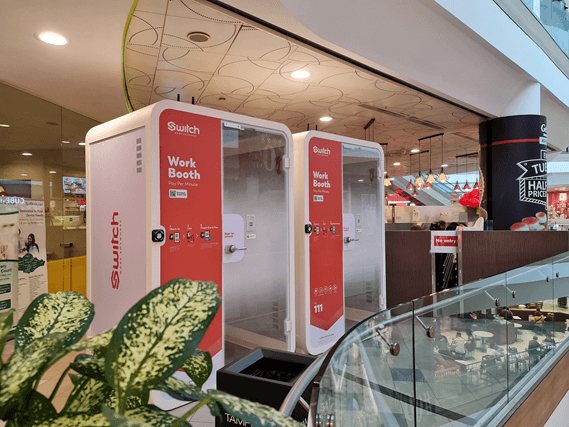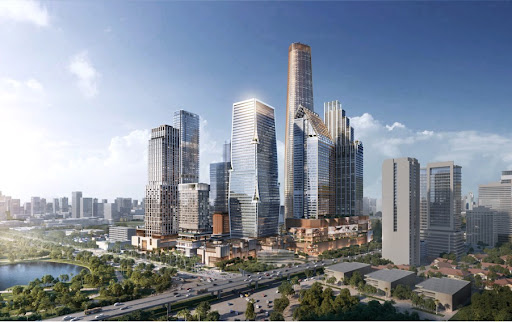Cities of the future will be smart, sustainable and liveable.
The coronavirus pandemic has led to changes in our approach to urban living. Increased online activity and the shift in our attitudes towards home and work are having far-reaching impact on the way that "smart" cities are designed, with a desire to create more convenient environments. This accelerated demand for future-ready cities needs more resources, from bank financing to development expertise.
Gregory Seow, head of global banking Singapore and global head of the Financial Institutions Group at Maybank, has seen this shift play out both as a business leader and as a financer to real estate clients. "How people use their real estate space has shifted dramatically with the need to work from home or anywhere," he says. "Creating spaces that balance interaction with family, friends and colleagues necessitates more thought in urban planning. Smart cities are the key to flexible living, reduced carbon emissions and higher living standards."
Quality of life with sustainable logistics solutions
The popular image of a smart city focuses on technology, but they are about much more than that. According to the Institute of Management Development, which produces the Smart City Index, the concept encompasses multiple aspects of "liveability", with technology raising the quality of life of the city's inhabitants.
The most recent index, released in October 2021 and based on the views of 15,000 people living across 118 cities, considers factors such as mobility and health and safety. City dwellers, it turns out, rank access to affordable housing, transportation, job opportunities and health services ahead of faster internet speeds.
Still, connectivity remains important and consumers' use of technology during the pandemic has driven change at the neighbourhood level. The surge in online shopping in recent years has resulted in huge demand for logistics sites within easy reach of residential areas, satisfying both increased demand and expectations of fast delivery.
CBRE estimates 138mn square metres of new logistics space will be needed globally in the next five years to fulfil e-commerce requirements. In some countries, such as the US, retail malls can be repositioned for this. Still, this need will not mean the death of community gathering points, with the possibility of malls being reconfigured from retail into other collective uses.
Wanshi Zheng, group chief strategy and planning officer of Frasers Property, says the Singapore-headquartered developer, which is active across Asia-Pacific and Europe, installed pay-as-you-go workspace booths in some of its retail malls during the pandemic, enabling people with restricted office access to work in a dedicated space. "Cities have had all sorts of hits over the centuries, but they always reinvent themselves," she says.

Switch booths are located at eight malls of Frasers Property, conveniently located in suburban regions, allowing users to work closer to homes for greater privacy and convenience.
Thinking big means going small
Residential areas are also transforming. A more humanistic approach to cities involves designing neighbourhood that everything a person needs to live, work and play is less than 20 minutes away. Business and industrial parks in city suburbs have the potential to fulfil these needs. Hubs where work, commerce and residential facilities overlap can comprehensively "serve the needs of their residents", Zheng says.
Frasers Property has established such parks in the UK, continental Europe and Australia, with sustainability at their core. Frasers Property's subsidiaries Frasers Property (UK) Ltd and Hillington Park Sarl recently announced funding through a sustainability-linked loan provided by Maybank Singapore, which has built a strong track record in green lending since 2016.
The loan, which adheres to sustainability principles established in May 2021 and updated in July 2021, will feature a reduction in interest margin from its second year if Frasers Property (UK) maintains its four-star Global Real Estate Sustainability Benchmark (GRESB) rating.
"Asset financing is changing in view of business sustainability and reputation management," says Seow. "Pegging a building's energy efficiency to third-party evaluations and getting the assets certified has become the norm. Managing assets in a socially responsible manner is central to long-term business prosperity."
Human-centric cities of the future
To be truly future-ready, buildings must also be about more than technology. Corporate tenants do not want inefficient facilities adding to their carbon footprints. With 40 percent of CO2 emissions attributable to the built environment, the drive to net zero will make this increasingly important in the future. Buildings that cannot be adapted to meet heightened sustainability regulation will become obsolete.

Consisting of Grade A office towers, retail precincts, luxury and lifestyle hotels and luxury residential towers, phase one of One Bangkok is scheduled for opening in the fourth quarter of 2023.
A showcase Frasers Property development incorporating all of these forward-looking trends is One Bangkok, in the heart of Thailand's capital. This holistically designed district will cover more than 40 acres, equivalent to the size of about 20 football fields. Cooling will be optimised and controlled centrally, as will water supply and energy management, with more than 250,000 smart sensors providing early warnings for maintenance.
Factors beyond the commercial are also driving the push for smarter cities and buildings. A silver lining of the pandemic, Zheng says, is increased awareness of our collective vulnerability to challenges such as mental health and climate change, and concerns for wellbeing are now behind a rethink of building design. One example of this is the contemporary trend for allowing more light into living areas. "Our buildings are our refuge, "Zheng says." And people expect more of them."
In conclusion, smart cities and buildings created to support human-centric design will be the backbone of urban living in the future, Seow says, adding: "As one of the leading corporate banks in Asean, Maybank is committed to partnering with real estate developers and asset owners to realise the cities of the future through providing green and sustainability-linked financing, as well as progressively transitioning more of our portfolio clients to embark on their sustainability journey."
This content has been produced by Maybank in collaboration with the Commercial Department of The Financial Times.

 Linkedin
Linkedin Facebook
Facebook Email
Email Whatsapp
Whatsapp Telegram
Telegram
